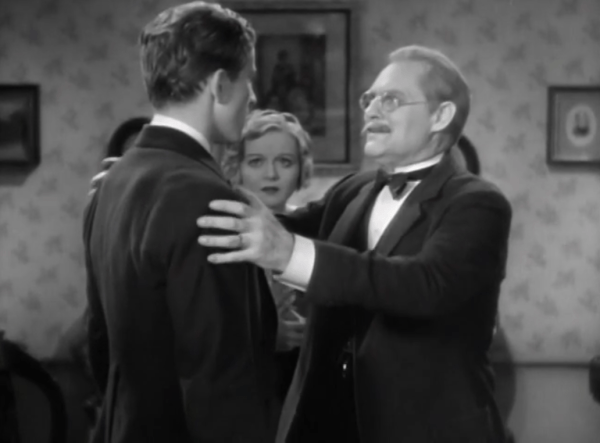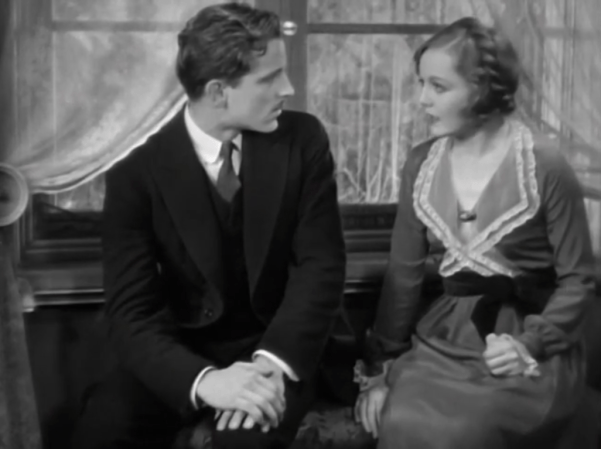
It intrigues me that this fascinating outlier in Ernst Lubitsch oeuvre, once upon a time was released as The Fifth Commandment. For those keeping count, it’s the one in the Catholic faith that says thou shall not kill or rather thou shall not murder. But already you might see the semantic ambiguities at play in the translation. In modern English, murder and killing can maintain different definitions. Often you only need to look at a human conscience to deduct the difference. This is integral to the movie’s core dramatic question.
However, we must first unveil the scene, introduced as only Lubitsch could envision it. It’s now the first anniversary of armistice: November 11, 1919. It becomes a montage of perceptive comic juxtapositions — with small-town jingoism in full-force — parades, bells ringing, and cannon shots booming right outside a hospital. No one seems to heed the sign calling for silence while the shell-shocked vets remain terrified by the living nightmare.
Then, inside a grand cathedral, the minister extolls peace in the wake of such carnage. Thinking better of it, Lubitsch focuses on the sabers of all the military men as they sit listening in the pews, weighed down by their many war medals — no doubt won in battles. The camera focuses on the crucifix hanging on the wall as “bombs burst in air.” These are all incongruous pictures if we want to make any sense of war.
With the stirring homily done, the pews clear out in a flurry and only one man is left prostrate in the pew. He comes up to the religious man seeking absolution. In a former life, he was a first violinist, now he wishes to confess to a “murder.” It registers a response of repugnance until the minster finds out it was out on the battlefield. He is freed from any crime having done nothing but his duty.
For this man, Paul Renard (Phillips Holmes), it’s some small recompense for the tribulation of his soul moaning out on his behalf — on behalf of the man he killed — because surely this is not the way men were supposed to live with one another.
In all earnestness he yells out, “I came to find peace and you haven’t given it to me.” He gets chastised, has his absolution read, and feels little better for it. Again, his heart still aches with guilt. His head goes aloft to the portrait of the Pietta — she lost her son — and she forgave the murderers…
It’s the germination of an idea: a mission of mercy and a personal pilgrimage. Paul must go to the homeland of the man he murdered and see his parents — to call upon their mercies — and assuage his wounded conscience. Holmes is a bit of an exaggerated talent but his zombie-like despondency allows him to function rather well in the shell-shocked part.
It’s apparent from the opening interludes a kind of pre-world war II chivalry and romanticism still exists between the Teutonic and Gallic traditions because they have yet to experience the full thrust of the radicalized regime of Hitler.
This doesn’t mean war is logical and totally naïve. Far from it. There’s a prescience in the following line from Raphaelson’s script: “9 million people got slaughtered and they’re already talking about another war and the next there will be 19 million and the world calls that sane.”

Broken Lullaby simultaneously becomes an impeccable exercise in how Lubitsch is able to take the material from Samson Raphaelson — their first of many collaborations together — and in some integral way, shape it to his will. Continually the dramatic irony can be cut with a knife, and so in specific scenes, you don’t need much more aside from the knowledge. Lubitsch does the rest and uses that to benefit his audience.
Because Renard makes his journey — dutifully visits the grave of the man he killed. War mothers often come to visit and on this day the dead man’s fiancée: Elsa (Nancy Carroll). He flees the scene like a frightened deer, but his mission is clear. He visits Dr. H. Holderlin (Lionel Barrymore); he is the father who lost his boy in the war. We know what must come next.
Lubitsch doesn’t make it easy — it detonates in our faces — wrenches the knife into our emotional hearts and forces us to continue on the dramatic arc. Even as Paul is eventually brought into the Holderlin family, he grasps at illusions to make them happy — in an attempt to not totally trample the fond memories of their son from when he was alive. Because he only knew the man in the pitiful trenches of war on the edge of death. It’s not a nice type of place to keep people within your memories.
Likewise, the town is a textbook Lubitschian environ of Europe through the lens of Hollywoodland. It’s the old world spritzed with the touches of the movies. It’s a magical land where the discrepancy of language and culture fall to the wayside in deference to emotional truth and visual elegance. Where Zasu Pitts showing up as a housemaid hardly feels anachronistic or out of the ordinary.
It also plays like a precursor to To Be or Not to Be‘s lucid commentary overlapping with the quaint familiarity of The Shop Around the Corner. There are many such establishments in a place like this. Perfect for blissful love to come into bloom. Because it’s true Paul and Elsa take a shine to one another — they share a naïve benevolence as they try and pick up the pieces in the shadow of war.
They also turn all the heads and ring all the bells in the town as they walk by together arm-in-arm. In this regard, any sense of realism or authenticity is made superfluous. This is a film made out of its emotional impressions more than anything else.
Meanwhile, Elsa’s scorned suitor drums up conspiracy about the foreigner with his brood of beer drinkers at the local Hofbrau. A newfound absurdity is born as they secretly contest the content of his locked violin case. Surely, it holds something far more nefarious than a musical instrument.
Finally, the good doctor is shocked out of any former strains of narrow-mindedness. He sees it spewed back at him, and it repulses his sensibilities. Barrymore stares down the gauntlet at all the men affronted by his house guest, and he lets them know promptly his wife likes him, Elsa likes him, and he loves him. It’s such a courageous pronouncement in such company.
He says, “No one can tell me the meaning of death or the meaning of hatred. I’ve drunk deep of both of them.” In some form, he’s beginning to understand the world anew much like Paul before him. Fathers drinks to the death of sons (on the other side). Some drink beer and others wine. It’s no different, and they all propagate the system of patriotic butchering. It’s insanity.
Broken Lullaby does what a majority of movies try to accomplish with any amount of dialogue and plot points. Lubitsch doesn’t need them. Instead, we get an impression. Paul is able to take up his original calling once more — that of a violinist — and he is joined on piano by Elsa. The parents look on in a contented reverie. Before us is the reconciliation of residual hurt leftover from an entire war allayed by two melodies joined together in perfect harmony.
We must stand corrected. The Broken Lullaby is the right title for the picture. It might be difficult to categorize for movie pundits, but this is of negligible importance here. What remains are the reactions. In turns, it’s moving and it’s excruciating. I was made totally distraught, and yet the salve is finer still.
Life, even today, is won in no man’s land where no one wants to go. Still, I am reminded of even a monumental moment of harmony like the famed Christmas day ceasefire in 1914. I’d like to believe restoration is possible. Lubitsch seems to suggest as much and he does so quite elegantly. I’d expect nothing less.
4/5 Stars
